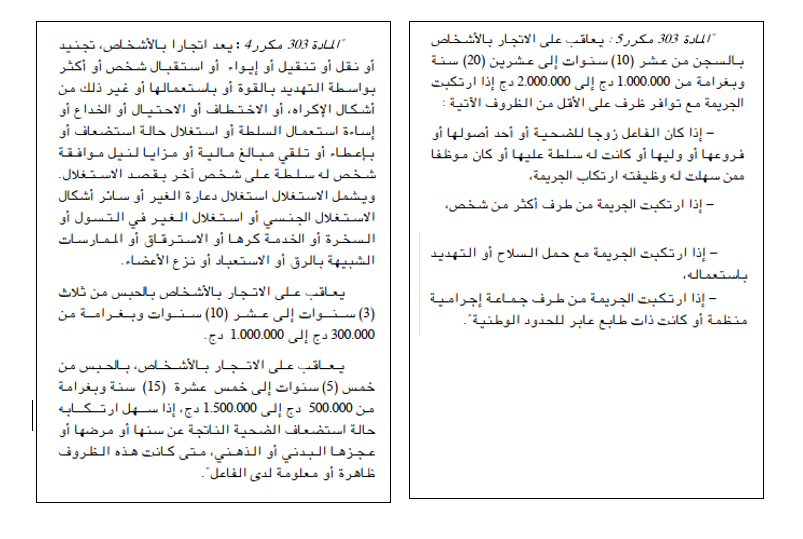Policy Commitment Against Forced Labour, Modern Slavery, Human Trafficking, and Child Labour
The University of Oum El Bouaghi is firmly committed to upholding international laws and conventions that prohibit all forms of exploitation, including forced labor, slavery, human trafficking, and child labor. Such practices are entirely incompatible with the values of our institution, and the university is determined to prevent and eliminate them in all forms.
Definitions:
- Forced Labor: Any work or service extracted from a person against their will through coercion, threats, violence, deception, or abuse of authority.
- Slavery: A condition in which a person is treated as property, subjected to control, and forced to work under ownership-like conditions.
- Human Trafficking: The recruitment, transport, or harboring of individuals through force, fraud, or coercion for the purpose of exploitation, including sexual exploitation or forced labor.
- Child Labor: The employment of minors in work that is detrimental to their physical, mental, or moral development. The university strictly condemns any such practice.
University’s Commitment:
The University of Oum El Bouaghi reaffirms its strong commitment to preventing and eradicating forced labor, slavery, human trafficking, and child labor. These acts constitute grave violations of human rights and are unequivocally condemned by the institution.
Actions and Measures:
- Legal Compliance: The university adheres to all relevant national and international laws and conventions concerning the elimination of these exploitative practices.
- Awareness and Training: Regular awareness programs and training sessions are provided to staff and students to promote understanding and respect for human rights and dignity.
- Reporting Mechanisms: A confidential reporting system is available to enable students and employees to report suspected cases of forced labor, slavery, human trafficking, or child labor without fear of retaliation. All reports are thoroughly investigated, and corrective action is taken as necessary.
- Due Diligence: The university ensures that its operations and supply chains are free from any link to exploitative labor, requiring suppliers and contractors to uphold the same ethical standards.
- Support for Victims: The institution is committed to assisting and protecting victims of exploitation by facilitating access to appropriate resources and support services.
This policy underscores the University of Oum El Bouaghi’s unwavering dedication to human rights, ethical conduct, and the promotion of fairness and dignity across all its activities.
Sources:
Forced labor and human trafficking: a guide for labor inspectors – International Labour Organization: https://www.ilo.org/wcmsp5/groups/public/—arabstates/—ro-beirut/documents/publication/wcms_204038.pdf
Strengthening measures to end forced labor – International Labor Office Geneva: https://www.ilo.org/wcmsp5/groups/public/—ed_norm/—relconf/documents/meetingdocument/wcms_217862.pdf
The University of Oum El Bouaghi stands firmly against forced labor, slavery, human trafficking, and child labor, in alignment with international laws and conventions. We are dedicated to creating an environment where human rights are respected, and these unethical practices are eradicated.
- University of Oum El Bouaghi Policy Against Forced Labor, Slavery, Human Trafficking, and Child Labor – Natioanal procedures
The University of Oum El Bouaghi is unequivocally committed to upholding Algerian national laws and regulations, including Law No. 09-01, enacted on February 25, 2009, which amends and supplements Order No. 66-156 of June 8, 1966, containing the Penal Code. The Algerian legislature has criminalized offenses related to forced labor, slavery, human trafficking, and child labor, as outlined in Articles 303 bis 04 to 303 bis 15.
National Procedures:

University’s Commitment:
The University of Oum El Bouaghi reaffirms its strong and ongoing commitment to preventing and eliminating forced labor, slavery, human trafficking, and child labor. The university acknowledges that such practices constitute serious violations of fundamental human rights and are morally and ethically unacceptable.
Actions Implemented:
- Legal Compliance: The university strictly adheres to all Algerian national laws and international agreements aimed at preventing forced labor, slavery, human trafficking, and child labor.
- Awareness and Training: Regular educational and training programs are provided for staff, faculty, and students to enhance awareness of these issues and promote a culture that values human rights and dignity.
- Reporting Mechanism: A confidential reporting system is available for employees and students to safely report any suspected cases of exploitation. All reports are handled with confidentiality, thoroughly investigated, and followed by appropriate corrective measures.
- Due Diligence: The university ensures that its operations and supply chains remain free from any form of exploitation and requires suppliers and contractors to maintain the same ethical standards.
- Support for Victims: The university is committed to assisting victims of forced labor, slavery, human trafficking, and child labor by ensuring access to appropriate support, protection, and resources.
Sources:
- Law No. 09-01 of February 25, 2009, which amends and supplements Order No. 66-156 of June 8, 1966, which includes the Penal Code.
The University of Oum El Bouaghi stands firmly against forced labor, slavery, human trafficking, and child labor, in compliance with Algerian national laws and international conventions. We are dedicated to creating an environment where human rights are respected, and these unethical practices are eradicated.